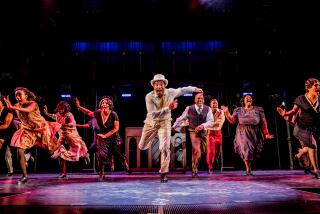DANCE REVIEW : JOFFREY SEASON ENDS WITH 2 ‘SHREW’ CASTS
- Share via
Two boyishly playful Petruchios and two almost eagerly submissive Katharinas took much of the sexist sting--and dramatic tension--from John Cranko’s “Taming of the Shrew” over the weekend in the Dorothy Chandler Pavilion.
Yet both Joffrey Ballet casts in the closing event of the fall season illuminated the pure-dance values in this 1969 full-evening Shakespearean ballet more incisively than even Cranko’s own Stuttgart Ballet managed in its last local visit four years ago.
Working to a pastiche-Domenico Scarlatti score by Kurt-Heinz Stolze, Cranko reshaped his literary source into a fantasia on the theme of false romantic expectations--notably deception-in-attraction versus morning-after (or post-marital) realities.
Cranko’s style inventively blended academic classicism and Soviet acrobatics with the European character-dance tradition and Georgette Tsinguirides’ production for the Joffrey (last danced here in 1983) lovingly preserved every broken line and twisty accent.
Besides confirming the status of Glenn Edgerton (Lucentio) as resident Joffrey danseur noble -elect, the company assignments for the three performances on Saturday and Sunday brought forth such casting-against-type surprises as a dark-haired Tom Mossbrucker (a memorably fatuous Hortensio), a blonde Dawn Caccamo (a definitively kittenish Bianca), a vulgar Leslie Carothers (paired with Charlene Gehm as the venal whores), plus a ludicrously clumsy and effete Luis Perez (returning as a guest Gremio with the Joffrey between appearances in a touring “West Side Story” revival).
Neither Beatriz Rodriguez (Saturday night) nor Denise Jackson (Sunday afternoon) provided much of a counterforce to the angry townspeople or on-the-make Petruchio in Act I. Yet each blossomed persuasively (if a bit too quickly) into radiant, womanly lyricism--Rodriguez revealing a childlike shyness that suggested hidden depths and utter trust in her husband, Jackson with a growing serenity that gave the rapturous final duet unexpected majesty.
Of the tamers, Philip Jerry (opposite Jackson) mimed more fluently and danced the bravura solos with greater flair. But Jerel Hilding brought to the role a stronger sense of sunny swagger, one that ideally complemented Rodriguez’s baleful glare. Allan Lewis conducted.
More to Read
The biggest entertainment stories
Get our big stories about Hollywood, film, television, music, arts, culture and more right in your inbox as soon as they publish.
You may occasionally receive promotional content from the Los Angeles Times.










